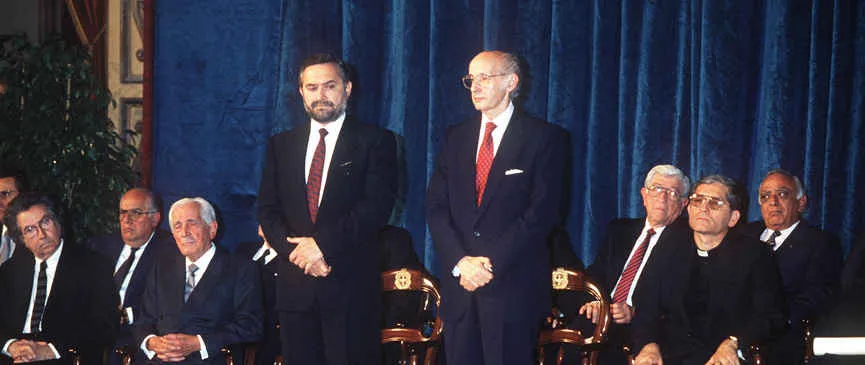Main content
Santiago Grisolía and Salvador Moncada Prince of Asturias Award for Technical & Scientific Research 1990

For his scientific work in highly diverse fields within Biochemistry.
Santiago Grisolía (Valencia, España, 1923 - 2022). After graduating in Medicine from the University of Valencia (1944), he did his doctorate thesis in Madrid (1949). At the age of 22 he left for the USA, having already published several experimental studies. He was professor Ochoa´s first graduate student in the Chemistry Department of the University of New York, where he worked on the fixation of carbon dioxide, a subject he would never abandon thereafter.
He was a lecturer in Biochemistry and Molecular Biology for many years at the University of Kansas, as well as at Chicago and Wisconsin, making classic discoveries in this university about the urea cycle, which have both fundamental and practical importance. Alongside this work, he continued with his studies on carbon dioxide fixing and demonstrated that citrulline is really an intermediary in urea synthesis, a fact which was also in debate at that time.
He is a corresponding member of the Academies of Science of Madrid and Cordoba (Argentina), and of the Belgian Academy of Medicine. He is, furthermore, an honourary professor of the faculty of Medicine at Valencia and doctor honoris causa of Salamanca, Barcelona, Valencia, Madrid, León, País Vasco, Siena, Florencia, Kansas, Las Palmas de Gran Canarias, Universidad Politécnica de Valencia, Universidad de Lisboa, Universidad Nacional de Educación a Distancia and Universidad de Castilla-La Mancha.
He has published more than four hundred scientific reports, and around thirty explanatory articles, likewise doing a vast amount of teaching and research work over many years in a wide range of European and American countries.
He was the distinguished Sam E. Roberts Professor at the University of Kansas, has been director, since 1980, of the International Programme of Molecular Cytology at the same university, Counsellor of the Biomedicine Institute of The Cell Surface Research Foundation in London, Chairman of the UNESCO Committee for Scientific Coordination for the Human Genome Project, director and founder of the Researcher Training School, covered by the Reciprocal Cooperation Agreement between the University of Kansas and the Institute of Cytology Research in Valencia. Creator and secretary of the Valencian Foundation for Advanced Studies and leading promoter of the current Rey Jaime I Awards, he received the Gold Medal for Merit in Research and University Education from Spain’s Ministry of Science and Innovation in 2011.
Chairman of the UNESCO Committee for Scientific Coordination of the Human Genome Project, he was deputy chairman of the Board of Trustees of the Prince Felipe Research Centre, and adviser to the President of the Generalitat Valenciana for Science and Technology. He has chaired the Valencian Council for Culture since 1996, the Advisory Boards of the Menendez Pelayo International University in Valencia and the Science Museums in Cuenca and Valencia.
Grisolía´s work has concentrated on subjects such as the enzymology of the nitrogen metabolism (urea cycle and the breakdown of pyrimidines), the metabolism of phosphoglycerates, the replacement and intracellular breakdown of proteins and the control of tubuline synthesis in the brain.
Salvador Moncada (Tegucigalpa, Honduras, 1944 -) after graduating in Medicine and Surgery from the University of El Salvador (1962-70), he expanded his studies, gaining doctorates in Pharmacology (1973) and Science (1983) from the University of London.
Fellow of The Royal Society, of the Royal College of Physicians and of the Academy of Medical Science, he holds honorary degrees from several universities in different countries. He worked as a teacher at the Universities of El Salvador and Honduras, and did several research projects at the Wellcome Research Laboratories in England, where he was in charge of the prostaglandin research team (1975-1985), and subsequently director of the therapeutic research division (1984-86). Since 1986, he has been the research director of the said laboratories. He has also worked as a visiting lecturer in Pharmacology at King´s College, London. He is also a Fellow of the Royal Society. He has cooperated, in the field of Medical Education, with the Pan-American Health Organisation, the WHO for Spanish American countries.
He taught at the Universities of El Salvador and Honduras and moved to London in 1971 to undertake a PhD in Pharmacology at the Institute of Basic Medical Sciences of the Royal College of Surgeons. After a short period at the University of Honduras, he returned to London and developed several lines of research at the Wellcome Research laboratories in Kent, England. He is a doctor "honoris causa" of the Complutense University of Madrid and the universities of Cantabria and Honduras. He has contributed to or directed more than 370 scientific scientific publications and has received various prizes for his research work. His main researches have concentrated on the pharmacological effects of vaso-active substances, especially the products of the metabolism of arachidonic acid, as well as the synthesis, actions and breakdown of the biological mediator, nitric oxide. He has also carried out important work on subjects of inflammation, platlets, the interaction between platlets and the vascular wall, and thrombosis and arteriosclerosis.
End of main content
